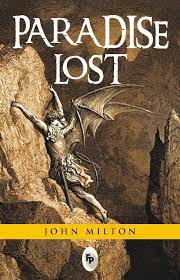Paradise Lost by John Milton
“Paradise Lost” by John Milton is an epic poem that delves into the biblical story of the fall of humanity, exploring themes of rebellion, temptation, and the nature of evil. First published in 1667, the poem presents a complex and profound examination of human existence, free will, and the consequences of our choices. In this review, we will delve into the key elements, strengths, and significance of this monumental work.
Summary Of the Book
“Paradise Lost” by John Milton is an epic poem that retells the biblical story of the fall of Adam and Eve from the Garden of Eden. The poem begins with Satan’s rebellion against God in Heaven and his subsequent banishment, determined to corrupt God’s newly created humans. Satan, a complex and tragic figure, uses persuasive rhetoric and cunning strategies to tempt Adam and Eve into disobedience.
Adam and Eve are portrayed as innocent and vulnerable beings susceptible to the allure of knowledge and the serpent’s deception. They eat the forbidden fruit, leading to their expulsion from paradise. Milton explores themes of temptation, the consequences of disobedience, and the struggle with guilt and loss.

The poem delves into theological and philosophical themes, grappling with the nature of evil, human suffering, and the delicate balance between free will and divine providence. Milton raises complex moral dilemmas and challenges readers to contemplate the boundaries of good and evil. Paradise Lost by John Milton He also explores the redemptive power of remorse and divine forgiveness.
Milton’s poetic skill and mastery of language are evident throughout the work. Paradise Lost by John Milton The use of blank verse, rich imagery, and intricate metaphors create a vivid and immersive reading experience. The epic scope of the poem is enhanced by the beauty and elegance of Milton’s language.
Also Read-
“Paradise Lost” holds immense cultural and literary significance. It serves as a religious and moral allegory, exploring themes that resonate across centuries. Milton’s exploration of the fall of humanity, the nature of good and evil, and the quest for redemption continues to captivate and inspire scholars and readers.
However, the density and complexity of the poem can be challenging for some readers. It requires patience and a willingness to engage with theological and philosophical concepts. Paradise Lost by John Milton The length and intricacy of the work may also be intimidating for those seeking a more accessible narrative.
Furthermore, the portrayal of women in the poem, particularly Eve, has been a subject of criticism. Paradise Lost by John Milton Some argue that the female characters are portrayed as weak and easily swayed, perpetuating gender stereotypes. This aspect has been a point of contention for modern readers.
Strengths Of The Book
“Paradise Lost” by John Milton possesses several strengths that contribute to its enduring status as a literary masterpiece:
- Epic Scope and Ambition: One of the most notable strengths of “Paradise Lost” is its grand and epic scope. The poem encompasses the fall of humanity, the rebellion in Heaven, and the cosmic conflict between good and evil. Milton’s ambition in tackling such expansive themes and narratives showcases his literary prowess and elevates the poem to a monumental work.
- Complex and Compelling Characters: The characters in “Paradise Lost” are richly developed and imbued with psychological depth. Satan, in particular, emerges as a complex and multifaceted figure. Milton portrays him as a tragic hero, embodying both heroic qualities and profound flaws. The nuanced characterization adds layers of complexity to the poem, allowing readers to grapple with moral ambiguity and the nature of evil.
- Poetic Mastery and Linguistic Beauty: Milton’s command of language and poetic technique is a standout strength of the poem. His use of blank verse, intricate metaphors, and vivid imagery create a lush and immersive reading experience. The beauty and musicality of Milton’s verse captivate readers, adding to the aesthetic appeal and emotional impact of the work.
- Exploration of Profound Themes: “Paradise Lost” delves into profound theological, philosophical, and moral themes. The poem wrestles with the concepts of free will, divine providence, the nature of evil, and the human condition. Milton’s exploration of these themes sparks intellectual contemplation and offers insights into the complexities of human existence and the human relationship with the divine.
- Influence and Cultural Significance: “Paradise Lost” has had a profound impact on literature, philosophy, and art. Its themes and ideas have permeated Western culture, inspiring countless works and influencing the thought of subsequent generations. The poem’s enduring legacy and its ability to provoke thought and reflection speak to its lasting strengths.
- Narrative Structure and Imaginative World-Building: Milton’s narrative structure, with its vivid depictions of Heaven, Hell, and Eden, showcases his imaginative prowess. He creates a detailed and imaginative world that serves as a backdrop for the characters and their conflicts. Milton’s ability to transport readers into these fantastical realms enhances the reading experience and adds to the poem’s enduring appeal.
Weaknesses Of The Book
While “Paradise Lost” is widely regarded as a literary masterpiece, it does have a few weaknesses that some readers may find notable:
- Complexity and Dense Language: One of the main weaknesses of “Paradise Lost” is its complexity and dense language. The poem requires careful reading and a deep understanding of biblical and classical allusions. Paradise Lost by John Milton The intricate syntax and vocabulary can make it challenging for readers, especially those unfamiliar with the historical and literary references.
- Lack of Female Agency: Critics have pointed out that the portrayal of female characters in “Paradise Lost” is limited, with Eve being the primary example. Some argue that she is depicted as weak and easily swayed, perpetuating gender stereotypes. Paradise Lost by John Milton The lack of agency for female characters is a notable weakness, particularly in a work that explores the consequences of human actions and choices.
- Absence of Non-Christian Perspectives: Another weakness is the absence of non-Christian perspectives in the poem. “Paradise Lost” is firmly rooted in Christian theology, which may limit its inclusivity and appeal to readers of different religious backgrounds or those seeking a more diverse range of perspectives.
- Ethical Ambiguity: Some readers may find the ethical ambiguity of the poem to be a weakness. Milton presents complex moral dilemmas and explores the nature of good and evil, often blurring the lines between right and wrong. Paradise Lost by John Milton While this ambiguity contributes to the intellectual depth of the poem, it may leave some readers craving more definitive moral clarity.
- Length and Pacing: “Paradise Lost” is a lengthy poem, consisting of twelve books and over ten thousand lines of verse. The sheer length and the slow pacing may be a deterrent for readers seeking a more concise or fast-paced narrative. Paradise Lost by John Milton The poem requires time and patience to fully engage with its intricate plot and thematic depth.
Conclusion
“Paradise Lost” is a profound and enduring work of literature that explores the fall of humanity and the complexities of human existence. Milton’s poetic brilliance, thematic depth, and exploration of theological and philosophical questions make it a significant piece of literature. Paradise Lost by John Milton While the complexity and length of the poem may pose challenges for some readers, the profound insights, vivid imagery, and exploration of timeless themes continue to make “Paradise Lost” a seminal work in English literature.
FAQ.
Q: Who is the author of “Paradise Lost”?
A: “Paradise Lost” is written by John Milton.
Q: When was “Paradise Lost” published?
A: “Paradise Lost” was first published in 1667.
Q: What are some of the major themes explored in “Paradise Lost”?
A: “Paradise Lost” explores a range of themes, including the nature of good and evil, the fallibility of human beings, the consequences of disobedience, the complexities of free will, and the divine plan of God. The poem also delves into philosophical and theological questions about the nature of God, the existence of evil, and the moral choices individuals face.
















